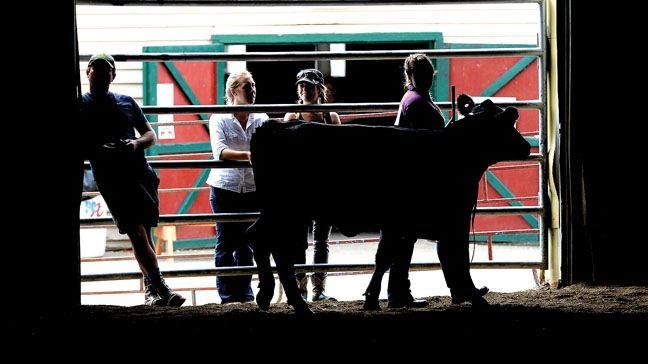4-H at the fair has been beefed up this year.
Always a popular inclusion at almost any fall fair in B.C., the annual showing of 4-H livestock and other achievement projects has been a staple of the BC Northern Exhibition (previously known as the Prince George Exhibition) since the 1930s when the youth development group (then called the Boys And Girls Club) began in this area. It was founded in the United States in the early 20th century and was adopted into Canada soon after. It still thrives in both countries.
"This year is our biggest year in a long, long time. 4-H has had to expand to three barns this year, from two for the last several years," said Angela Crowe, a former member of the group and now a parent of current 4-H members.
"Not only is our membership rising in the rural areas but with gardening, photography, dog, small engine mechanics, outdoor living, rabbit and, next year, sewing we are able to offer projects to that the kids in town can take part in," she said.
The growing enrolment is helped by local parents' search for activities for their kids that foster friendship, productive use of time, responsibility skills, even business acumen. It is also benefiting from society's renewed interest in healthy food and sustainable industry.
"The demand for locally raised, grain-fed animals with no added hormones has increased and 4-H has been able to provide the access to this market to the public," Crowe said.
The kids who choose the food-based projects (each member picks one or sometimes several hands-on goals each year, like the raising of a domestic animal from birth to market) learn how agriculture works via regular instructions from leaders and from their own experiences along the way. This helps disseminate grassroots knowledge into the community, over time.
But the most immediate and direct way the public can take advantage of the 100-mile diet values of 4-H is to purchase one of the market animals brought to the BCNE for the annual auction. The livestock sale is a critical learning component for the members, as it marks the successful completion of their livestock project, but it also represents essential return on their investment. The members and families pay for the raising of the beef, sheep, goat, swine and other animals themselves, keeping careful weekly records of the money spent on the animals' care and growth. A good price at the auction pays back that investment, but a weak auction price may mean a financial loss on the project.
The 4-H organization works to attract a large auction audience each year in the hopes that bidding will be strong and ensure the members go home without suffering any red ink on their ledgers.
"Prince George has always been an amazing town for supporting the kids but we need to increase the awareness that you and your neighbor can come and buy a market animal," Crowe said. "We will transport it to the butcher for you. Now you have healthy, homegrown food for your families."
The auction this year will have beef, swine, poultry, goats and rabbits for sale. Those who purchase any of these animals can take the 4-H organization up on their standing offer to look after the butchering at an approved and inspected local abattoir, or you can do so yourself. Some buyers even opt to keep the animals as pets (primarily this happens with some of the rabbits, as purchasers know they are used to being regularly handled by the 4-H members so they are more apt to be family-friendly).
"We are so excited to see the growth in 4-H over the past few years," Crowe said. "It shows that this organization, which is over 100 years old, is one of the places benefiting from the drive for people to live and eat healthier. We all have to eat, so we all need the farmers and we are raising a great bunch of future farmers in our community."
The BCNE takes place Aug. 18-21 at the Exhibition Park facilities around CN Centre. There is a multitude of agricultural, historical and cultural features to enjoy - everything from amusement rides to rodeo, home arts displays to live entertainment.
The 4-H component of the festivities goes on throughout the fair. Many competitions and demonstrations are held to show judges, the public, and 4-H members themselves the progression in their skills and achievements.
The auction part of their youth development experience happens on Aug. 20 starting at 6 p.m. (auction cards can be obtained as of 3 p.m. at the 4-H barn).
It is fun to observe and bidding is encouraged. Animals are often purchased by businesses, as a way of supporting local youth, and often purchased by groups of buyers intent on sharing the meat.



